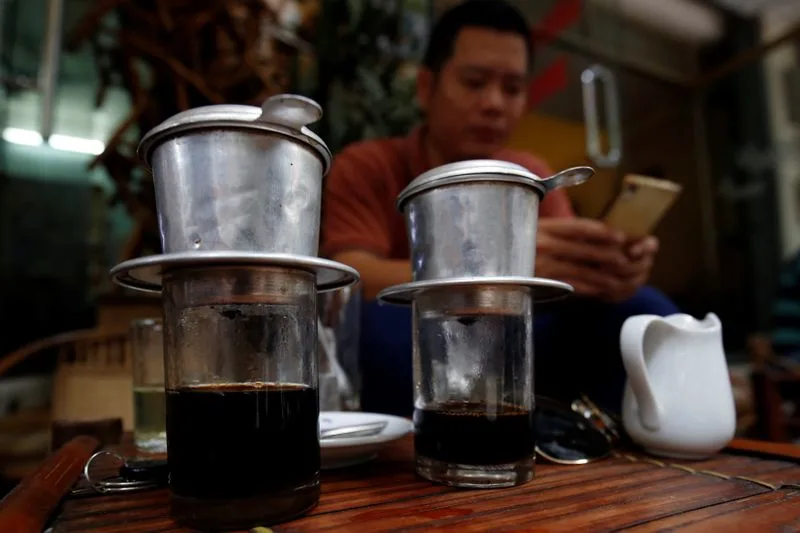LONDON/HANOI -- Farmers in major coffee exporter Vietnam are refusing to deliver coffee they have sold unless contracts are renegotiated following a surge in global prices to a 28-year high.
Vietnam is the world's largest supplier of robusta coffee and the standoff is adding impetus to a rally in robusta prices with supplies in Europe becoming very tight.
The country had its poorest crop in six years in the 2022/23 season and some contracts were rolled forward into the 2023/24 season meaning a large crop was needed for farmers to fulfil all their commitments.
This season's harvest was, however, also sub-par.
The poor crops drove prices much higher and farmers felt they could not afford to deliver at the agreed prices and have sought to renegotiate their contracts.
"I would not say we broke the contract. When prices went up, we renegotiated the prices with buyers. For now, we only release beans if buyers can match our quoted prices," said a Vietnamese farmer in Dak Lak, the main producing region, speaking on condition of anonymity.
The standoff, which initially impacted local Vietnamese dealers, has now filtering out into the wider market, tightening global supplies and helping push the benchmark world price index COF-DWAROB-ICO to its highest since 1995.
Traders estimate that the delivery of between 1-2 million bags of last season's pre-sold Vietnamese coffee - or up to 8.5% of the country's total exports - was delayed following the harvesting of a poor crop in the 2022/23 season.
Although much of that coffee has since been delivered, it has left less coffee available for sale this season, exacerbating the price rally.
Two more farmers in Dak Lak, also speaking on condition of anonymity, said they were delivering pre-sold beans but they have had to renegotiate the price because of how much the spot market has rallied.
Traders who baulk at paying up are left short of supply of robusta, which is mainly used in instant coffee, espresso and blends of ground coffee.
A Vietnam-based trader said in December and January, there were still some deliveries of pre-sold coffee, but he expects these will fall sharply in the months ahead as he now cannot even get hold of suppliers who owe him this low-priced coffee.
Even though they have written contracts, global traders say it is not worthwhile for them to sue local suppliers because of the expense involved.
Mentality shift
One Europe-based trader said he received just 20% of the Vietnamese coffee he was meant to get last November and December. The coffee was bought last August at a price some 20% below current local rates.
Instead, he is trying to convince his suppliers to deliver a small portion of the low priced coffee in return for large volumes of orders for coffee priced at current spot rates.
Those who agree still get a good average rate for their coffee, he explained, but added that the strategy only works if one has good relationships with relatively reliable suppliers.
"The mentality shift is huge, today even if you pay the spot (rate) you might not get as much (coffee) as you want," he said.
All the traders Reuters spoke to declined to name their problem suppliers due to 'sensitive' talks currently underway with them.
An industry expert said all global traders operating in Vietnam have been impacted by the situation.
These include Louis Dreyfus, Sucafina, Volcafe and Neumann Kaffee Gruppe, who between them purchase most of the coffee Vietnam produces for export, and whose trading activities, because of their size, tend to impact world prices.
Louis Dreyfus, Sucafina and Volcafe, a unit of ED&F Man, did not respond to requests by Reuters for comment.
Neumann Kaffee Gruppe said it was 'too early to make an accurate statement' about the supply situation in Vietnam, because it is still unfolding.
Vietnam, which produces more than a third of the world's robusta, harvested 26.3 million bags of coffee last season - a six-year low - with the current season seen at 26.6 million, U.S. Department of Agriculture data shows.
Given the dwindling supplies, many market participants have been turning to the ICE Futures Europe exchange for coffee, driving stocks down.
ICE-certified robusta stocks are currently at 10-year lows, according to data from a second Europe-based trader. Falling ICE stocks are visible to the entire market so tend to drive benchmark ICE futures prices higher.
"There's a likelihood this robusta story will persist until the new (robusta) crop (from Brazil is harvested). Even then I'm not convinced it's over," said a trader, referring to possible relief some time around mid-2024.



















































